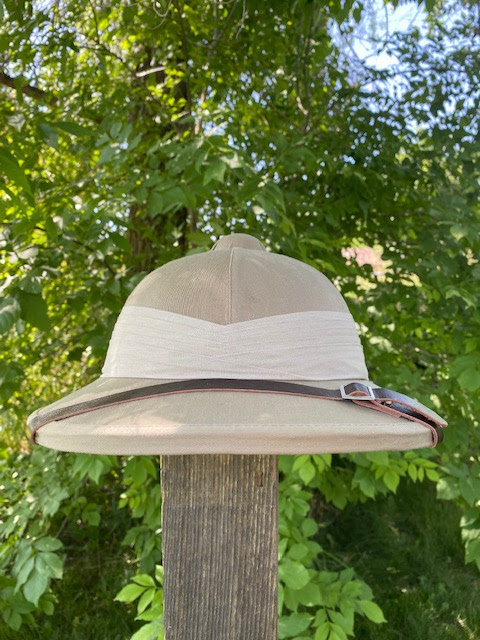I recently purchased an African Safari Pith Helmet from the Village Hat Shop for $49.95. Because I chose the slowest shipping method, there was no charge for shipping. It was three days before the helmet shipped and then it took another 4 or 5 days to arrive, which was fine. They offer faster shipping, at a price, if you prefer.
The price is actually pretty good on this item. I had intended to get one last summer, but the only seller that had them in stock was charging about twice as much. This year that seller was out of stock and a search brought up the Village Hat Shop. Obviously at this price, it is not a U.S. made item, but this and all the other pith helmets in stock were made in Vietnam. But the helmets I was looking at last year were also produced in Vietnam.
I would note that the Village Hat Shop sells different types of pith helmets, including the style issued to British troops during the colonial period, with colors (depending on the style) in either khaki or white. I went with a basic African Safari version because it wasn't as tall as the British pith helmet and had a broader brim, but also featured the green lining unlike some of the other styles of pith helmet.
So, the first thing to note about this helmet is that it is an actual pith helmet and not a reproduction "jungle hat" or some such made of cloth covered plastic and lacking the pith wood. That means that the hat is intended to be soaked in water so the wood will absorb water. The idea behind these helmets is to take advantage of evaporative cooling. That is, as the helmet heats from the sun and from your body heat, the warmer water evaporates leaving the cooler water molecules behind and lowering the temperature in the helmet and keeping you cool. This is assisted by the fact that the helmet has webbing to keep it up off your head to allow air to circulate; and by venting holes on the sides of the helmet and at the top of the helmet. Obviously, it works much better if there is some air movement and, as I discovered, even a slight breeze made a wonderful difference over dead air.
The instructions on the web site indicate that the helmet should be inverted and placed in a bucket of water to absorb the water through the top (outside) of the helmet, and specifically warns against trying to fill the helmet from the inside. The reasons for this, I would suppose, is that it provides for better absorption of water; there are large holes in the sides of the helmets for circulating air, and so if you try just dumping water into the helmet, it is just going to run out anyway, before it has a chance to soak up any of the water.
I let mine soak for about 20 or 30 minutes before using it for a long walk, but I think that it really needed a longer period as the water seems to have fully evaporated after about 30 minutes or so.
One of the nice features with this particular model is that it featured green colored lining which, as you may know, is much easier on the eyes in bright light (thus the "green rooms" used by actors to give them a break from bright stage lights). I've seen some pith helmets issued with tan or grey linings which are not going to be as easy on the eyes if there is a lot of glare.
You can also see in the photograph above the interior webbing intended to keep the helmet perched above your head and aid with air circulation. On each side you can see two air holes with aluminum grommets to let air in, and then an aluminum piece at the top where are the vents to allow air out. The head strap/sweat band is adjustable somewhat, using a piece of velcro tab.
The chin strap was a little disappointing. The website describes it as a composite leather, but it looks like a thin strip of vinyl or Naugahyde. I haven't tried it. The web site calls it decorative, but the buckle is serviceable, so I might give it a try when in the desert where it is typically windier than in town.
Going around the helmet so you can view it from all sides:
I tested it on a recent weekend. We've been having unusually cool weather this month, so temperatures were only in the upper 70s. The hat worked well for about 30 minutes, with the evaporative cooling in a brief but brisk breeze making me wonder about taking it off because my head got so cold. But after the water had evaporated, it basically turned into a normal sunhat, albeit with a bit better air circulation. As I mentioned above, I think that soaking it longer initially might help. I may also try the initial soak and then periodically stop and splash some water into the interior to see if that might help refill the hat, so to speak.
I didn't see any discoloration in the fabric after soaking and using the hat. I'm sure that if I were using natural sources of water there would be some natural discoloration develop.
In conclusion, the helmet seems of good quality for the price and works as intended. Although it may not be the height of fashion, it was originally intended as a piece of practical headwear and that is my intention with using it.






I could never get one of those. I'd be saying, "I say, old chap" all day.
ReplyDeleteYou could try the French style and say "wee, wee" instead.
Delete